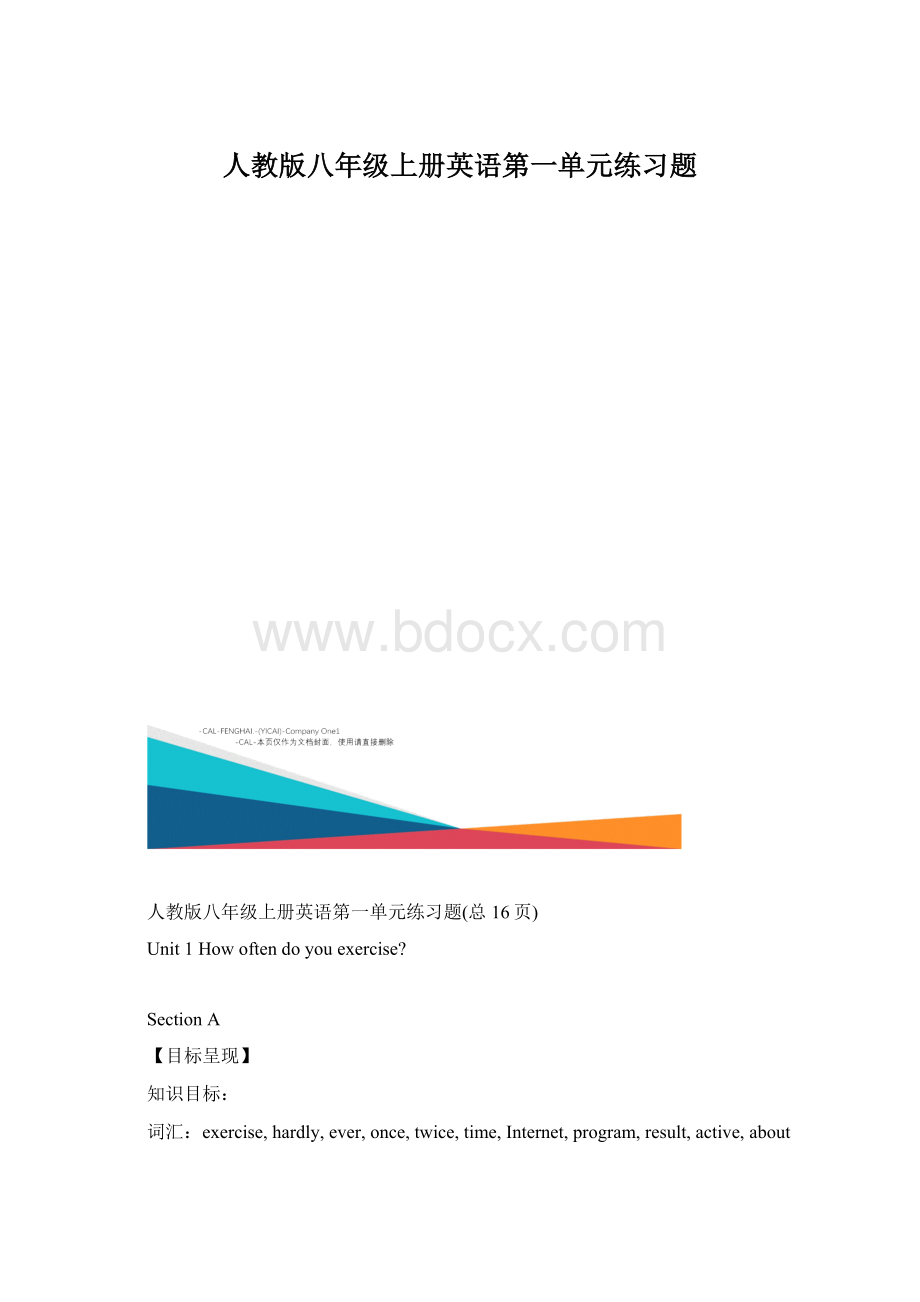人教版八年级上册英语第一单元练习题.docx
《人教版八年级上册英语第一单元练习题.docx》由会员分享,可在线阅读,更多相关《人教版八年级上册英语第一单元练习题.docx(13页珍藏版)》请在冰豆网上搜索。

人教版八年级上册英语第一单元练习题
人教版八年级上册英语第一单元练习题(总16页)
Unit1Howoftendoyouexercise?
SectionA
【目标呈现】
知识目标:
词汇:
exercise,hardly,ever,once,twice,time,Internet,program,result,active,about
短语:
watchTV,gotomovies,surftheInternet,goshopping,readbooks,onceaweek,twiceayear,threetimesaday,theresultof,asfor,
句型:
1.—Whatdoyouusuallydoonweekends
—Ioftengotothemovies.
2.—Howoftendoyoushop?
—Ishoponceaweek.
3.—Howoftendoessheexercise?
—Sheexerciseseveryday.
语法:
一般现在时
能力目标:
学习描述课余时间的活动安排,初步培养学生的语言综合运用能力。
情感目标:
培养学生的逻辑表述能力,激发学生的积极思维,并使学生互相了解,增进友谊,加强人际交往,以形成良好的人际关系。
教师寄语:
Itneverwillrainroses.Whenwewanttohavemoreroseswemustplanttrees.—G.Eliot
天上永远不会掉下玫瑰来,如果想要更多的玫瑰,必须自己种植。
—G.艾略特
【基础巩固】
自主学习
一、重点词汇运用
1.Iwenttothezoot__(两次).
2.Heoftens__theInternetattheweekend.
3.Theboyisa__(活跃的)atschool.
4.—What’syourfavoritep__
—ChineseCooking
5.Childrenliketos__(踩滑板)afterschool.
二、重点词组识记
1.至于________________________
2.Howoften____________________
3.上网________________________
4.highschool____________________
5.一周三次____________________
6.onceortwiceayear____________________
7.在周末______________________
8.moststudents____________________
三、重点句型体验。
根据所给的图画情景或提示词,写出英语句子,标点符号已给出。
1.
2.
3.
4.
5.
1.he,usually,inthemorning______________________________.
2.he,howoften______________________________
3.twiceaweek______________________________.
4.Mike,hardlyever,______________________________.
5.Mymother,sometimes______________________________.
知识要点
1.Howoften多久(一次)
Howoftendoyouexercise你多久锻炼一次身体
Howoftendoesyourmothergoshopping你妈妈多久购一次物
【区别】Howoften和Howmanytimes
①Howoften用来提问某个动作间隔多久发生一次,即询问动作发生的频率。
通常对一些表示频率的副词进行提问;也可以对频度短语进行提问。
②Howmanytimes意思是“多少次”,是用来提问做某事的次数的,往往就once,twice,threetimes等词语进行提问。
典型例题:
1)LiMingdoeshishomeworkeveryday.(就划线部分提问)→
HowoftendoesLiMingdohishomework?
解析:
everyday属于频度短语,就频度短语提问用Howoften.
2)Theoldmanwenttothezoothreetimesthisyear.(就划线部分提问)→
Howmanytimesdidtheoldmangotothezoothisyear?
解析:
这里就次数提问用howmanytimes.
2.hardly几乎不,简直不
Therearehardlyanystudentsintheclassroom.几乎没有学生在教室里。
Thereishardlyacloudinthesky.天空中几乎没有云。
【区别】hardly与hard
①hardly不是hard加后辍所构成的,它是副词,常与can或any连用。
②hard可用作形容词,意思为“艰难的,困难的,勤奋的”可等同于“difficult”。
它也可用作副词,意思是“努力地,刻苦地,猛烈地”。
典型例题:
1)学好英语不难。
(翻译成英语)→
解析:
答案是It’snothardtolearnEnglish.这里hard为形容词,艰难的,困难的。
2)Wemust(努力学习).
解析:
在英语中努力学习或努力工作,我们常用workhard来表示,这里hard是副词,修饰前面的动词work.故答案为:
workhard
随堂达标
一、单项选择
1.—HowoftendoesKategohiking?
—.
A.Iguessshe’sOK.B.Aboutanhour.C.Oncetheweek.D.Twiceaweek.
2.Thereare50studentsinourclass.75%studentslikegoinghiking.Whatdoes“75%”mean?
A.Noneofthestudents.B.Allthestudents.
C.Mostofthestudents.D.Someofthestudents.
3.Theyusuallydosomeofficeworkweekdays.
A.inB.onC.atD.bothBandC
4.Ihavetimetohavelunch.
A.sometimesB.hardC.hardlyD.already
5.—doyougoshopping?
—EverySunday.
A.HowsoonB.Howmanytimes
C.HowmuchD.Howoften
二、用单词的适当形式填空。
1.Myfatherplaysbasketball____________(two)aweek.
2.Jodieoften____________(exercise)inthepark.
3.Mariais____________(act)atschool.
4.He____________(watch)TVeverynight.
5.—Howoftendoesyourmotherexercise?
—____________(one)aweek.
三、完成句子
1.—你周末通常做什么_
___________________________________
—我通常踢足球。
____________________________________
2.—他多久看一次电影
—他一周看一次。
____________________________________
3.你最喜爱的电视节目是什么?
____________________________________
4.我妹妹一周看二至三次电视。
____________________________________
5.至于家庭作业,大部分学生天天做。
____________________________________
四、短文填空
A:
Hi,LiLei.Whatareyou
(1)____________
B:
Iamreadingaletter
(2)____________mypenpal.
A:
How(3)____________doesshewritetoyou?
B:
Onceamonth.
A:
(4)____________shelikeChina
B:
Yes,shedoes.
A:
Doyougettogetherduringthesummerholiday?
B:
Yes,andwealwayshaveagoodtime.
A:
Whatdoyouusually(5)____________duringthesummerholiday?
B:
Weoften(6)____________someplacesofinterest.
A:
Whatdoesshe(7)____________ofthem?
B:
Shethinkstheyaregreat.
【能力提升】
语法练习
A.单项选择
1.—doyouhaveaclassmeeting?
—Onceaweek.
A.HowmuchB.HowoftenC.WhattimeD.Howlong
2.Iseeherinthesupermarket.
A.sometimeB.sometimeC.sometimesD.sometimes
3.—didyouwatchTV?
—Abouttwohours.
A.HowfarB.HowoftenC.HowsoonD.Howlong
4.Theresults“watchingTV”areinteresting.
A.atB.inC.forD.on
5.Heisagoodstudent.Helateforschool.
A.isn’tneverB.isoftenC.isalwaysD.ishardlyever
B.句型转换
1.Moststudentsexercisethreetimesaweek.(就划线部分提问)
domoststudentsexercise?
2.Isleepninehourseverynight.(就划线部分提问)
hoursdoyousleepeverynight?
3.MyfavoriteprogramisAnimalWorld.(就划线部分提问)
yourfavoriteprogram?
4.Mysisteroftengoestoamovieonweekends.(就划线部分提问)
yoursisteroftenonweekends?
5.Shesometimesdoesherhomeworkatschool.(就划线部分提问)
doessheherhomeworkatschool?
中考链接
()1.—______is“Lucky52”shownonCCTV-2?
—Everyweek.(2006年,黄冈)
A.HowoftenB.Howlong
C.HowsoonD.Howmanytimes
()2.—Howwastheweatheryesterday?
—Itwasterrible.Itrained______.Peoplecouldgoout.(2006年,甘肃)
A.hardly;hardlyB.hard;hard
C.hard;hardlyD.hardly;hard
()3.—doyouexercise?
—Fourtimesaweek.(2006年,宁夏)
A.HowmuchB.HowoftenC.HowlongD.Howmany
快乐阅读
Earlytobed,earlytorise,makesamanhealthy,wealthyandwise.
ThisisanoldEnglishsaying.Haveyouheardofitbefore?
3.Itmeansthatwemustgotobedearlyandgetupearlyinthemorning.Thenweshallbehealthy.Weshallalsoberich(wealthy)andclever(wise).
Thisistrue.4.Thebodymusthaveenoughsleeptobehealthy.Childrenofyoungageshouldhavetenhours’sleepeverynight.Childrenwhodonothaveenoughsleepcannotdotheirworkverywell.Theywillnotbewiseandtheymaynotbecomewealthy!
Thebodyalsoneedsexercise.Walking,running,jumping,swimmingandplayinggamesareallexercise.Exercisekeepsthebodystrong.Exercisealsohelpstheblood(血液)tomovearoundinsidethebody.Thisisveryimportant.Ourbloodtakesfoodtoallpartsofourbody.Theheadalsoneedsblood.Exercisehelpsustothinkbetter!
回答下列问题:
1.What’sthemeaningof“Earlytobed,earlytorise”inChinese?
___________________________________________________
2.Howmanyhoursshouldyoungchildrensleepeveryday
___________________________________________________
把文中划线的句子翻译成汉语。
3.___________________________________________________
4.___________________________________________________
根据短文内容填空:
5.____________isanotherwayofsaying“rich”.
6.Theheadalsoneeds____________.
SectionB
【目标呈现】
知识目标:
词汇:
milk,junkfood,coffee,chocolate,drink,health,habit,try,lifestyle,grade,better,same,as,different,difference,unhealthy,maybe,although,keep,must,less
短语:
howmany,ofcourse,lookafter,alotof,drinkmilk,begoodfor,eatjunkfood,eatinghabits
句型:
1.Mymotherwantsmetodrinkit.
2.Shesaysit’sgoodformyhealth.
3.Itrytoeatalotofvegetables.
语法:
一般现在时的运用
能力目标:
能阅读介绍饮食习惯方面的文章。
情感目标:
学会养成良好的生活习惯和饮食习惯。
从而合理安排自己的生活,养成健康的生活习惯,享受丰富多彩的校园生活。
教师寄语:
Inprosperity,ourfriendsknowus;inadversity,weknowourfriends.—C.Collins
在顺境中,朋友结识了我们,在逆境中,我们了解了朋友。
—C.柯林斯
【基础巩固】
自主学习
一、词语检测
根据句意及所给的首字母或汉语提示,完成单词。
1.Childrenlikedrinking____________(牛奶).
2.Whatwouldyoulike,____________(咖啡)orcola?
3.I’mi____________tokeephealthy.
4.Eatingalotoffruitsisgoodforourh____________.
5.Therearesome____________(不同)betweenyouandme.
二、短语互译
1.对……有益____________________
2.drinkmilk____________________
3.我的饮食习惯____________________
4.prettyhealthy____________________
5.努力干……____________________
6.getgoodgrades____________________
7.照顾____________________
8.eatlessmeat____________________
三、根据提示完成句子。
1.吃得太多有害于我们的健康。
(begoodfor…)
___________________________________________________
2.我将尽力把这份工作干好。
(trytodosth.)
___________________________________________________
3.他也许是一位老师。
(maybe)
___________________________________________________
4.我有许多作业要做。
(alotof/lotsof)
___________________________________________________
5.虽然他已80岁了,但他还相当健康。
(although/though)
___________________________________________________
知识要点
1.【区别】maybe,maybe
maybe是副词,意思是“也许,可能”,相当于perhaps,常用于句首。
如:
Maybehewillcallyoutomorrow.或许他明天给你打电话。
maybe是由情态动词may和系动词be构成,译成汉语为“可能是”,在句中作谓语。
如:
Tommaybeathome.汤姆可能在家。
Maybe和maybe有时可以互相转换。
如:
Maybeheisright.可等同于:
Hemayberight.
2.although的用法
although表示“虽然”,是从属连词,引导让步状语从句,语气较重,且比较正式,所引导的从句放在主句前后均可,可用though替换。
注意:
though/although不能和but同时出现在一个句子中,但可以和yet连用。
如:
Although/Thoughitissnowing,itisnotverycold.=Itissnowing,butitisnotverycold.=Although/Thoughitissnowing,yetitisnotverycold.虽然下着雪,但并不是很冷。
随堂达标
一、单项选择
1.Mymothertoldme________youanything.
A.tellnotB.nottellC.tonottellD.nottotell
2.“I’lltrymistakesagain.”Shesaid.
A.don’tmakeB.nottomakeC.notmakeD.tonotmake
3.Wouldyouliketoeat?
A.somethinghealthyB.anythinghealthy
C.somethinghealthD.healthysomething
4.Doingmorningexercisesyourhealth.
A.isbadtoB.isgoodforC.isbadforD.isgoodto
5.heworksveryhard,hefails.
A.BecauseB.SinceC.ifD.Although
二、用单词的适当形式填空。
1.Alotofvegetableshelpyou____________(keep)ingoodhealth.
2.Mymotherwantsme____________(drink)some